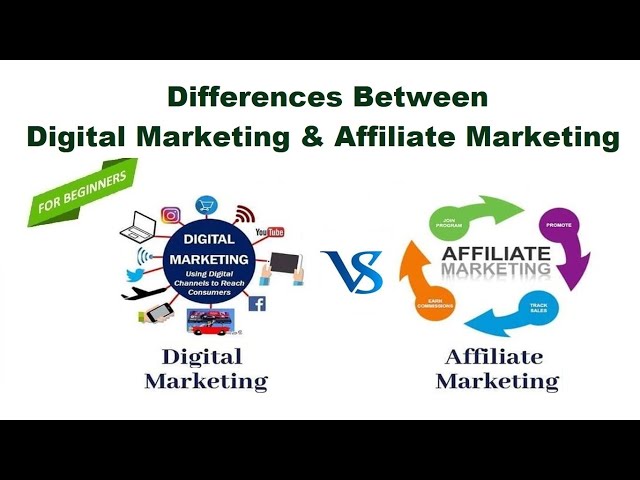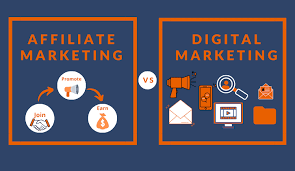Best Definition of the Difference Between Digital Marketing and Affiliate Marketing, In the rapidly evolving world of online business and advertising, it’s essential to understand the nuances between different marketing strategies. Two of the most prominent approaches, digital marketing and affiliate marketing, are often mistakenly used interchangeably, but they are, in fact, distinct in their methods, goals, and implementation.
In this comprehensive blog post, we will delve into the best definition of the differences between digital marketing and affiliate marketing. By understanding these distinctions, you’ll be better equipped to develop and implement the most effective marketing plan for your business, whether your focus is on building your brand, driving direct sales, or leveraging the power of influencers and partnerships.
What is Digital Marketing? : Best Definition of the Difference Between Digital Marketing and Affiliate Marketing

Digital marketing is a broad term that encompasses a wide range of strategies and tactics used to promote products, services, or brands through digital channels. At its core, digital marketing is all about leveraging the reach and versatility of the internet and various digital platforms to connect with and engage your target audience.
- Channels and Tactics
The digital marketing landscape is vast, with a multitude of channels and tactics to choose from. Some of the most common digital marketing strategies include:
- Search Engine Optimization (SEO): Optimizing your website and content to rank higher in search engine results pages (SERPs)
- Social Media Marketing: Leveraging platforms like Facebook, Instagram, LinkedIn, and Twitter to build brand awareness and engage with your audience
- Content Marketing: Creating and distributing valuable, relevant, and consistent content to attract and retain a clearly defined audience
- Email Marketing: Utilizing email campaigns to nurture leads, promote products or services, and stay top-of-mind with your subscribers
- Pay-Per-Click (PPC) Advertising: Investing in paid advertising on search engines, social media, or other digital platforms to drive traffic and generate leads
- Measurable and Scalable
One of the key advantages of digital marketing is its measurability and scalability. Through various analytics and tracking tools, you can closely monitor the performance of your campaigns, measure the return on investment (ROI), and make data-driven decisions to optimize your strategies continuously. - Personalized Experiences
Digital marketing also allows for a high degree of personalization, enabling you to tailor your messaging, content, and offers to the specific needs and preferences of your target audience. This level of personalization can lead to enhanced engagement, higher conversion rates, and stronger customer loyalty.
What is Affiliate Marketing? Best Definition of the Difference Between Digital Marketing and Affiliate Marketing

Affiliate marketing, on the other hand, is a performance-based marketing model where an individual or business (the “affiliate”) promotes the products or services of another company (the “merchant”) in exchange for a commission on any resulting sales or leads.
- Partnership-Driven Approach
The core of affiliate marketing lies in the relationship between the affiliate and the merchant. Affiliates leverage their audience, influence, and marketing channels to drive traffic and conversions for the merchant’s offerings, while the merchant provides the products, marketing materials, and a commission structure to incentivize the affiliate’s efforts. - Commission-Based Compensation
Affiliates are typically compensated based on a pre-agreed commission rate, which is often a percentage of the sale or a fixed amount per lead or conversion. This structure aligns the interests of both the affiliate and the merchant, as the affiliate is motivated to promote the products or services effectively to earn higher commissions. - Diverse Affiliate Channels
Affiliates can utilize a wide range of channels to promote the merchant’s offerings, including their own websites, blogs, social media platforms, email lists, and even physical stores or events. The flexibility of affiliate marketing allows for a diverse range of marketing approaches to be employed. - Tracking and Measurement
Affiliate marketing relies heavily on tracking and measurement to ensure accurate attribution of sales and leads to the correct affiliates. Merchants typically provide affiliates with unique tracking links or codes to monitor the performance of their promotional efforts and calculate the appropriate commissions.
The Key Differences Between Digital Marketing and Affiliate Marketing
Now that we’ve established the definitions of digital marketing and affiliate marketing, let’s explore the key differences between these two marketing approaches:
Here is a table summarizing the key differences between digital marketing and affiliate marketing:
| Attribute | Digital Marketing | Affiliate Marketing |
|---|---|---|
| Ownership & Control | Owned and controlled by the business | Shared control between merchant and affiliate |
| Funding & Investment | Requires more upfront investment by the business | Lower barrier to entry, merchant often bears product/service costs |
| Audience Reach | Aims to reach a broad audience through various digital channels | Leverages the existing audience and influence of the affiliate |
| Measurement & Attribution | Robust analytics and tracking capabilities | Focus on measuring performance of individual affiliates |
| Primary Focus | Long-term brand building and customer relationships | Short-term sales and conversions |
The most effective marketing strategies often involve a combination of digital marketing and affiliate marketing, capitalizing on the unique strengths and benefits of each approach. By integrating these two complementary strategies, businesses can create a powerful and comprehensive marketing plan that drives both long-term brand building and short-term revenue growth.
Some key ways to leverage the strengths of both digital marketing and affiliate marketing include:
| Leveraging the Strengths of Both Approaches | Digital Marketing | Affiliate Marketing |
|---|---|---|
| Brand Awareness and Reach | Ability to reach a broad audience through various digital channels | Leverage the existing audience and influence of affiliates |
| Customer Relationships | Focus on long-term brand building and customer relationships | Short-term sales and conversions through affiliates |
| Analytics and Tracking | Robust analytics and tracking capabilities | Focus on measuring performance of individual affiliates |
| Funding and Investment | Requires more upfront investment by the business | Lower barrier to entry, merchant often bears product/service costs |
| Ownership and Control | Owned and controlled by the business | Shared control between merchant and affiliate |
This table compares the strengths of digital marketing and affiliate marketing across several key areas, including brand awareness and reach, customer relationships, analytics and tracking, funding and investment, and ownership and control. By understanding the unique advantages of each approach, businesses can leverage the strengths of both to create a more effective and well-rounded marketing strategy.
Pros and Cons : Digital Marketing vs Affiliate Marketing
Pros :
- Full control over branding, messaging, and customer experience
- Ability to reach a broad, targeted audience through various digital channels
- Robust analytics and tracking capabilities to measure performance
- Opportunity for long-term brand building and customer relationships
Cons :
- Requires more upfront investment and resources
- Increased competition and potentially higher cost per acquisition
- Difficulty in standing out in a cluttered digital landscape
- Potential for ad fatigue and decreased engagement over time
Pros :
- Lower barrier to entry and startup costs
- Leverage the existing audience and influence of affiliates
- Ability to drive short-term sales and conversions
- Shared risk and revenue model with affiliates
Cons :
- Less control over branding, messaging, and customer experience
- Difficulty in measuring and attributing overall marketing performance
- Potential for affiliate fraud or misalignment of incentives
- Reliance on the success and reputation of affiliated partners
By understanding the unique pros and cons of each approach, businesses can determine the best strategy or combination of digital marketing and affiliate marketing to achieve their marketing objectives and maximize the return on their investment.
Conclusion
In the ever-evolving world of online marketing, understanding the nuances between digital marketing and affiliate marketing is crucial for businesses looking to succeed in the digital landscape. By recognizing the unique strengths and applications of each approach, you can develop a comprehensive marketing strategy that harnesses the power of both to drive sustained growth, brand awareness, and customer engagement.
Whether you’re a seasoned marketer or just starting your digital journey, we hope this blog post has provided you with a clear and concise definition of the differences between digital marketing and affiliate marketing. As you continue to navigate the complexities of online marketing, remember that the most effective strategies often involve a strategic blend of these complementary approaches.
If you have any additional questions or would like to share your own experiences with digital marketing and affiliate marketing, feel free to leave a comment below. We’re always eager to engage with our readers and continue the conversation about the future of online marketing.
